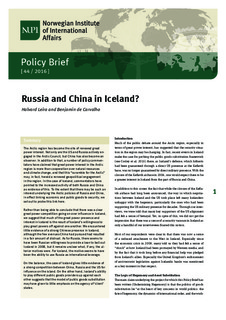| dc.description.abstract | The Arctic region has become the site of renewed great power interest. Not only are the US and Russia actively engaged in the Arctic Council, but China has also become an observer. In addition to that, a number of policy commentators have claimed that great power interest in the Arctic region is more than cooperation over natural resources and climate change, and that this “scramble for the Arctic” may, in fact, herald a renewed geopolitical engagement in the region. In the case of Iceland, commentators have pointed to the increased activity of both Russia and China as evidence of this. To the extent that there may be such an interest underlying the Arctic policies of Russia and China, in effect linking economic and public goods to security, we set out to probe this link here. Rather than being able to conclude that there was a clear great power competition going on over influence in Iceland, we suggest that much of the great power presence and interest in Iceland is the result of Iceland’s willingness to play great powers off against one another. We encountered little evidence of a strong Chinese presence in Iceland, although the few avenues China had pursued had resulted in a fair amount of distrust. As for Russia, there seems to have been Russian willingness to provide a loan to bail out Iceland in 2008, but it remains unclear what, if any, the ulterior motives were. For Iceland, the motive seems to have been the ability to use Russia as international leverage. On the balance, the case of Iceland gives little evidence of a strong competition between China, Russia and the US for influence on the island. On the other hand, Iceland’s ability to play different public goods providers up against each other suggests that the model of public goods substitution may have given to little emphasis on the agency of ‘client’ states. | nb_NO |

